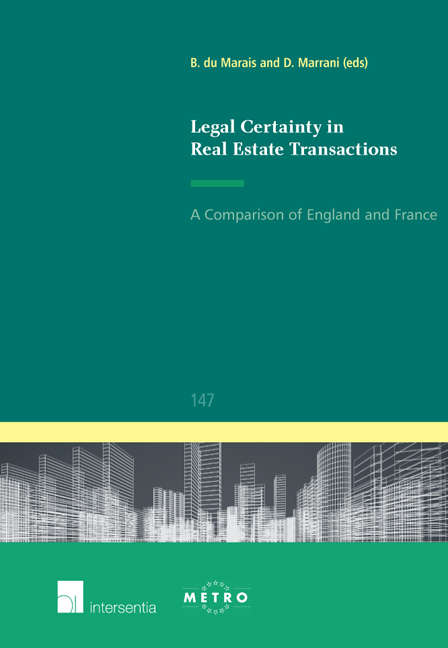Book contents
- Frontmatter
- Contents
- Introduction
- Part I The Idea Of Legal Certainty
- A Theoretical Approach
- B Practical Approach
- Part II Legal Certainty In Property Transaction: A Comparative Approach
- How to and Why Measure the Efficiency of Real Estate Transactions in France?
- Overview of how a Real Estate Transaction is Conducted in France
- Property Transactions in English Law: General Principles
- Commercial Leases in English Law
- Part III Measuring Legal Certainty
- Conclusion
- Miscellaneous Endmatter
Overview of how a Real Estate Transaction is Conducted in France
from Part II - Legal Certainty In Property Transaction: A Comparative Approach
Published online by Cambridge University Press: 21 September 2018
- Frontmatter
- Contents
- Introduction
- Part I The Idea Of Legal Certainty
- A Theoretical Approach
- B Practical Approach
- Part II Legal Certainty In Property Transaction: A Comparative Approach
- How to and Why Measure the Efficiency of Real Estate Transactions in France?
- Overview of how a Real Estate Transaction is Conducted in France
- Property Transactions in English Law: General Principles
- Commercial Leases in English Law
- Part III Measuring Legal Certainty
- Conclusion
- Miscellaneous Endmatter
Summary
Assessing the legal security of a real estate transaction involves presenting the operation's various phases.
From the outset, we can stress the importance of the real estate transaction in our cultural and, consequently, our legal tradition. Associated with the law of contract in its technique, the specificity of the real estate transaction ties in with the nature of the property, which represents a portion of the national territory and, as such, one that is subject to the rules that fall under the authority of the State and its territorial communities. In this respect, we must emphasize the growing number of controls and restrictions that have been imposed upon the real estate market by the State since the second half of the 20th century, at a pace that shows no signs of slowing down. Any modification of real property infers an administrative authorisation. The prerogatives of the State and the numerous standards it imposes, for various objectives (land-use planning, environmental protection, etc.), beset any real estate transaction, and represent essential elements that have a profound effect on the value of the private property and the conditions of its transfer.
The prerequisite to the real estate investment is the initial decision which, in the context concerned, i.e. the purchase of an office building by a company, assumes that various factors are analysed (market conditions, economic growth, taxation, political stability) and that they have proven positive in the eyes of the investor. This decision is the starting point of the operation that involves finding a property asset corresponding to the selected criteria.
Searching for the asset to acquire/selling an asset
The search for a property asset can be carried out by an intermediary, the real estate agent, who will be mandated to search for the asset on behalf of the investor and/or the vendor. The scope of the agent's mission may vary. As a minimum, it will entail searching for the asset. At the other end of the scale, it may include the negotiation and even the drafting of a pre-contract.
The vendor may also task the real estate agent with the sale of an office building by adjusting the scope of the mandate of sale.
- Type
- Chapter
- Information
- Legal Certainty in Real Estate TransactionsA Comparison of England and France, pp. 77 - 82Publisher: IntersentiaPrint publication year: 2016



